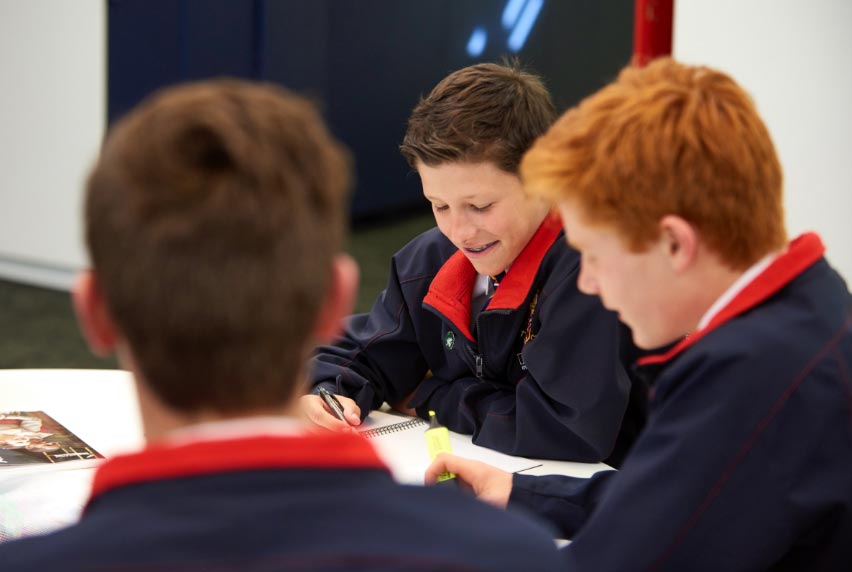English at Peninsula Grammar School is so much more than a single subject. It’s a broad foundation to a whole world of learning. As well as knowledge, students develop cognitive skills, which they will apply throughout their lives, academically, socially and in their chosen careers.
English
English
The keystone of learning



Philosophy
English is central to the critical thinking, learning and development of all our students. It creates confident communicators, imaginative thinkers and informed citizens. It is through the study of English that our students learn about themselves and to analyse, understand, communicate and build relationships with others and the world around them. Engaging in English and Literature provides important opportunities for learning about aspects of the human experience.
Innovations
Peninsula Grammar English students are capable of thinking both critically and creatively. Through engagement with texts from the contemporary world and from the past, and using texts from Australia and from other cultures, our students understand that the experience of reading bonds us, binds us and connects us. We ensure that our students learn to listen to, read, think, view, speak, write, create and reflect on increasingly complex texts with accuracy, fluency and purpose.
We provide meaningful and enjoyable encounters with a wide variety of literary texts, with the precious exchange between writer and reader always held at the fore.
EXPLORE OUR ENGLISH
CURRICULUM
Junior School
Our approach to literacy aims to install a love a language and literature. We develop a strong sense of reading engagement and promote this through explicit instruction and exploration of a variety of texts through our library program. We aim to install strong comprehension strategies in our students to equip them with the skills to understand and to be critical thinkers of texts at a deeper level. We develop our students’ understanding of explicit writing structure and language features whilst still providing students with opportunities to develop their creativity and love of writing. We develop student confidence with spoken language and through explicit instruction and encouragement students develop the skills to be confident and articulate communicators in a 21st century environment.
Reading
- The ultimate aim of our reading program is to produce confident, competent and independent readers
- Teachers explicit teach strategies for students to develop strong reading engagement, fluency and comprehension
- Teachers use the Scope and Sequence and the Victorian Curriculum to inform their teaching practice
- Alignment of reading strategies and reading content to units of inquiry allows for students to develop deeper connections and understanding
- The strategic use of a range of reading procedures ensures this as it provides a strong foundation for a comprehensive reading program
- Teachers promote a range of reading experiences to develop confident and fluent readers. These include; reading to students, listening to reading, modelled reading, shared reading, guided reading, literature circles and independent reading
- Each reading approach involves varying degrees of responsibility for both the teacher and student. Using a selective range of reading approaches ensures that explicit instruction and guidance, when needed, is balanced with regular opportunities for the independent application of skills and strategies
- Teachers differentiating their reading practice and use the literacy framework of the Daily 5 to achieve this
- Monitoring a student’s growth in reading is achieved by Fountas and Pinnell Running Records
Writing
- All students in the Junior years explore a variety of text types throughout the year. The text types each year level needs to cover is outlined in the writing scope and sequence
- For each text type, the students will engage in the writing process (pre-writing, planning, drafting, editing and proof reading and publishing)
- Students will engage in other forms of text type writing connected to their learning where relevant (letter writing, constructing emails etc)
- A model text of each text type will be available for students.
- Where possible, text types and writing experiences are connected to units of inquiry and or experiences
- All writing tasks have an intended purpose and audience which drives students’ motivation and effort towards writing
- Teachers raise students’ awareness and activate students’ prior knowledge about a particular form of text. E.g. reading to and reading with students. The understanding of the text type can be reinforced throughout different curriculum areas. Students will analyse text types, resulting in students ‘discovering’ the framework of a particular form of text
- Students are involved in the development of success criteria.
Speaking and Listening
- The teacher’s role is to ensure that students develop the confidence to become effective speakers and listeners in order to meet their future needs in social, academic, family and community contexts
- Teachers explicitly teach the strategies needed to be effective communicators in authentic contexts
- It is integrated into unit planners and therefore doesn’t have its own unit planner
- To effectively teach speaking and listening, teachers provide meaningful opportunities for students to talk for a range of purposes
- Teachers spend more time in targeted teaching groups, as it allows them to personalise the curriculum for students and to differentiate tasks according to individual student’s needs
Spelling
- Words Their Way enables enable teachers to assess, clearly identify and document each student’s spelling stage, and tailor activities to improve student’s spelling knowledge and skill
- It is a teacher-directed, student centered approach to vocabulary growth and spelling development whereby students engage in a variety of sound, pattern and meaning activities, sorting pictures and words
- It caters for differentiated learning in the classroom, rather than a one-size fits all model
- Students are differentiated based on their spelling stage and are grouped accordingly
- Differentiated groups are flexible, allowing teachers to move students based on their spelling needs
- Words Their Ways is aligned to the Victorian Curriculum and has an Australian Supplement program
Middle School
In the Middle Years, our students develop the core skills of Reading, Writing, Speaking and Listening. They engage with a variety of texts in which the primary purpose is aesthetic, but also learn to appreciate the text as a construct. Our Middle Years’ students study, discuss and analyse various types of media texts. They enjoy novels such as Wonder by RJ Palacio, Runner by Robert Newton and A Christmas Carol by Charles Dickens, as well as plays such as Frankenstein by Philip Pullman. Slam poetry and pop sonnets at Year 8 explore themes of interpersonal relationships and environmental concerns and enable our students to experience the joy of writing and performing their own poems in our very own ‘Slam Championships’.
Our students create a range of imaginative, informative and persuasive text types, ultimately learning the importance of voicing ideas and sharing opinions in a focused and engaging way.
Pre Senior School
Our Pre Senior English students are independent readers and as such are supported and extended by a range of complex, challenging and unpredictable texts. They explore themes of human experience through their studies of Shakespeare and consider ethical and global dilemmas within real-world and fictional settings. They view plays in performance and consider how a director’s interpretation alters meaning. Our students have the opportunity to engage in robust discussion around texts which represent a variety of perspectives. They explore novels such as Life in Outer Space by Melissa Keil, The Protected by Claire Zorn and Delirium by Lauren Oliver. They also study a range of war poetry and verse which explores the human condition.
Our students create a range of increasingly complex texts which include narratives and literary analyses. They are confident interacting in a range of face-to-face and online/virtual environments.
Senior School
Our Year 10 English course is characterised by diversity and choice. Students develop and justify their own interpretations, selecting from a text list which includes Richard III, The Great Gatsby, Lord of the Flies, Death of a Salesman and Gattaca. Students learn about literary critical theory and become adept at applying literary perspectives to texts and evaluating these against their own interpretations. Our students study a range of contemporary and classic short stories and then develop their own written style by experimenting with language features, stylistic devices and text structures.
VCE English provides the communication skills that are necessary for all other VCE subjects and also for life beyond School. The course develops skills in critical engagement with literary texts and encourages students to consider how the Australian Media influences readers. Students produce both creative and analytical responses to a range of authors, from Euripides and Arthur Miller to Australia’s own Toni Jordan and Alice Bishop. Peninsula Grammar English students are confident, articulate and critically aware communicators who develop a sense of themselves, their world and their place within it.
Our VCE Literature course provides an academically stimulating environment for those who love to read. Our students explore the way texts represent the complexity of the human experience. They develop an understanding and life-long appreciation for Literature through their exploration of works by Shakespeare, Sylvia Plath, Seamus Heaney, Tom Stoppard, Cate Kennedy and Maxine Beneba Clarke amongst others. Our students learn to be independent, innovative and creative, developing the ability to read widely and deeply and to articulate their views with clarity and confidence.




